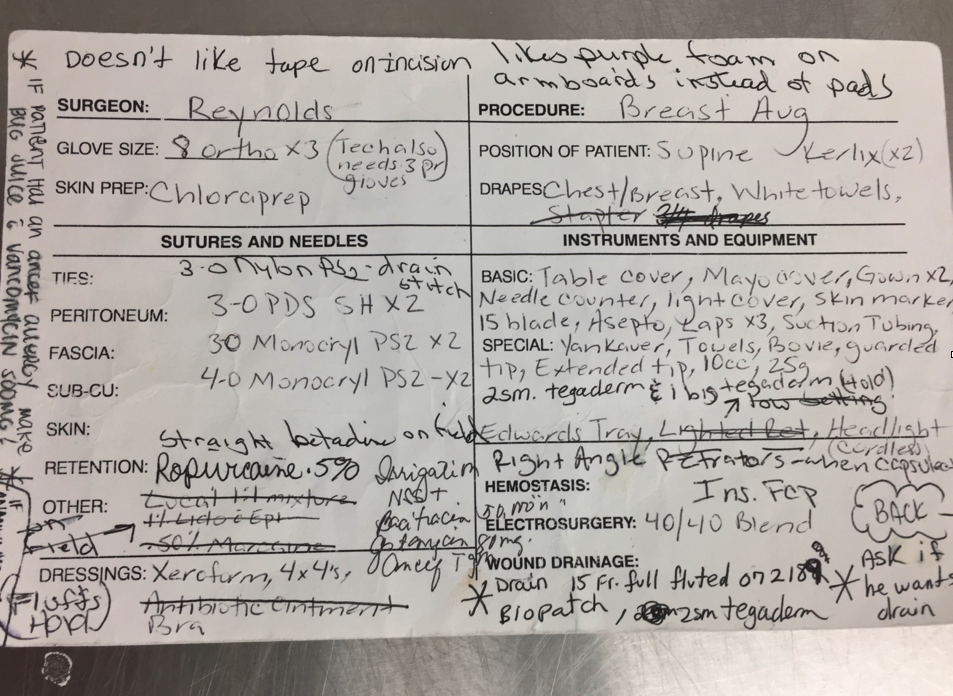What you see in this HORRIFYING image above is known in the healthcare industry as a ‘Preference Card’. If you ever have surgery, your life may very well depend on the accuracy of this card.
;
;
Surgical preference cards list the instruments, medical supplies, and medication that a surgeon requires while carrying out their surgical procedures. These cards are essential in providing safe medical care for patients and seamless processes for doctors. Surgeries depend on the accurate and timely availability of surgical supplies.
;
;
The shocking truth is that as many as 70% of Surgery Centers in the United States use these types of paper preference cards. It’s no wonder that up to 250,000 deaths occur every year because of Medical Error.
;
;
While 250k deaths is a big number, what’s even more common is how often these paper cards lead to other negative outcomes that cause a traffic jam of sorts in the entire healthcare system. It’s estimated that as much as 60% of your healthcare insurance spending is spent on waste, fraud and abuse. Let that sink in.
So much of that waste, fraud and abuse can be attributed in part (or directly) to the use of Paper Preference Cards in the OR.
Disadvantages of Paper Preference Cards
;
Using traditional preference paper cards comes with many limitations, and these challenges make inventory management & case costing very difficult for surgery centers and hospitals. Some of the specific factors that make paper preference cards unreliable include:
;
;
Paper Cards Can Be Illegible
;
Wear and tear, poor handling, and illegible handwriting make it challenging to interpret the content. Misinterpretation leads to inaccurate preparation and results in a more dangerous procedure. The average mistake on a card leads to a 17 minute delay.
;
;
Paper Cards Can Get Lost
;
Paper cards are easy to misplace, especially when you factor in various people making changes to the cards. Lost preference cards lead to gaps in the inventory system and are the root cause of inaccurate supply costs in the health system.
;
;
Card Errors Lead To Time Wastage
;
Surgeons & OR staff take time to list items on their preference cards, despite their busy schedules. When errors occur, aside from the actual delay it take to resolve the issues in the OR, there is a high likelihood of disagreement among various OR team members with no one willing to take responsibility. It takes a lot of time to resolve such stalemates.
;
;
Paper Cards are Difficult to Use for Case Costing
;
Most institutions have to deal with an incredible amount of preference cards, making it challenging to compare all items presented by various surgeons. While it is technically achievable, it is time-consuming and poses an accuracy challenge as these cards are prone to errors and manipulation.
;
;
High Chances of Surgeon Dissatisfaction
Surgical operations are sensitive, and every surgeon looks forward to working when the OR & patient are prepped how they expect them to be. When items are missing on the operating table, it can lead to anxious moments and jeopardize surgical operations.
;
;
Paper Cards are Hard to Share Across Digital Devices
;
Nowadays, most healthcare facilities have invested in technology to provide efficient and timely services. And the staff that work in these facilities are used to high-end digital experiences in their own lives. The days of critical procedure information being stored on paper inside of cabinets and drawers are quickly coming to and end. The risk is too great and the opportunity cost is even greater.
Implications to Healthcare
;
Looking at the downside of paper preference cards, it is clear that their continuing use has some serious medical care implications. Below are a few examples:
;
;
Patients
;
Successful patient recovery after surgery depends on whether all the required tools, equipment and medication were available during an operation in an efficient manner. When all resources are available, the operating team can pay close attention to their patient and avoid wasting time looking for missing items.
;
;
Without proper tools, surgical procedures can lead to unnecessary complications or surgery cancellations. When urgent operations are delayed, there is an inevitable risk of loss of lives and incapacitation.
;
;
Surgeons
;
Inaccurate and outdated cards don’t go over well with surgeons. With surgical procedures taking the bulk of resources in most healthcare institutions, it makes little sense to work with disgruntled surgeons. Happy and content surgeons inspire patients and other staff in the operating room for better results.
;
;
When physicians have to work with limited or incorrect resources continuously, it is just a matter of time before they look for greener pastures. A facility that experiences high staff turnover is likely to receive fewer patients over time, resulting in dwindling revenues.
;
;
Supply Chain
;
Major supply chain problems due to inaccurate preference cards include hoarding tendencies, preference for certain inventory products and out-of-stock items that may lead to overspending and higher supply costs.
;
;
Perks of Electronic Preference Cards
Automation and adoption of electronic preference cards is an essential consideration for modern healthcare providers. When you adopt digital cards, here are some of the benefits you can expect:
;
;
Accurate Cards
;
For many reasons, electronic cards have higher accuracy levels and are easy to standardize. After thousands of hours in the OR working with preference cards of all types, we’ve identified 10 core reasons why cards become inaccurate, and paper cards are at the heart of many of them. If you’re interested, you can find all 10 contributing factors HERE.
;
;
User-Friendly Interface
;
A reliable preference card system is easy to understand and use. The Perfect Preference Card has at least these 8 key items listed. These 8 items not only make the cards more accurate, but they make it easier to use.
;
;
Easy & Quick Updating
;
Updating items on digital preference cards are generally easier than with paper, thanks to accessibility on different electronic devices and technology assisted recommendations. PrefCards even has a feature that allows Nurses to make a change recommendation right from their phones in less than 10 seconds. When you’re rushing from one surgery to another, this type of functionality is the difference between a requested change actually getting made or not.
;
;
Easy to Identify Cost Variations
;
With electronic preference cards, it makes it much easier to compare items used by different surgeons and identify cost variations at a glance. This process is virtually impossible with paper cards if you have more than a few surgeons to compare.
;
;
Customizable Cards
;
Any digital solution worth a damn will give your team the ability to customize the way your cards are laid out so that they fit your process. Facilities often think paper cards give them more flexibility, but in reality, paper actually limits your ability to customize cards in a way that is meaningful and scalable for different types of procedures.
;
;
Surgeon Satisfaction
;
Established and respected surgeons and are always in high demand. They often can choose where they take their patients. Hospitals and ambulatory surgical centers often recruit top surgeons. Accurate and high quality preference cards build trust and confidence in your operating rooms and help keep surgeons satisfied.
;
;
Cloud-Based Storage
;
Physical cards pose storage challenges, and they easily get lost or worn out. Cloud storage guarantees that preference cards remain up to date and eliminate the risk of loss.
;
;
Conclusion
;
Please stop using paper preference cards! The cost is just too great.
;
;
If you’d like to see demo of PrefCards, or you just have some questions about switching from Paper, you can find us at PREFcards.com.


